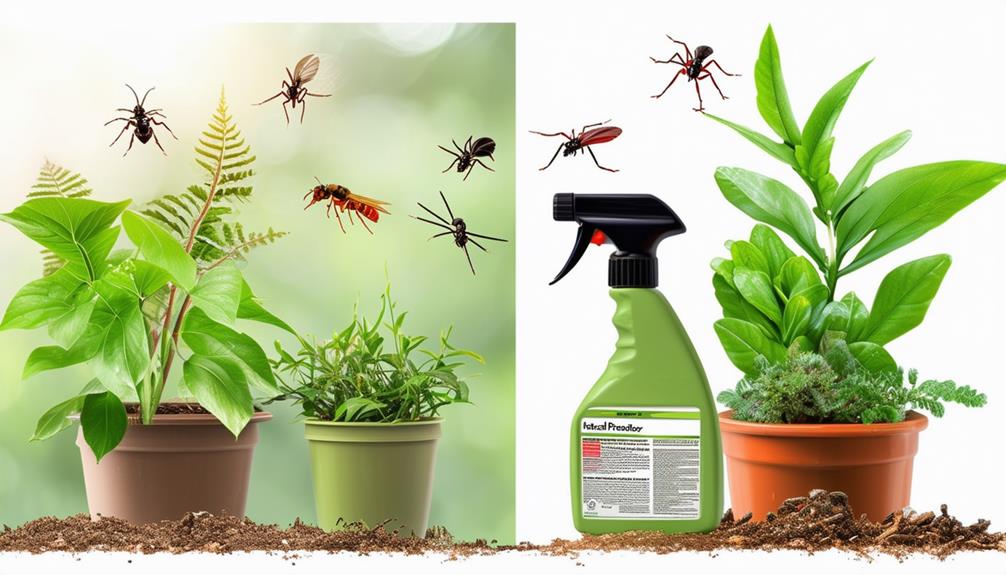Take control of mosquitos at home using DIY remedies that are proven to work. Try lemon eucalyptus oil, recommended by the CDC, or opt for neem oil to target larvae. Citronella is effective for outdoor use. Create homemade sprays with citronella, lemongrass, and lavender. Utilize garlic and essential oils for natural repellents. Build DIY traps with plastic bottles, sugar water, and yeast. Mosquito-proof your yard by installing screens and eliminating standing water. Employ a multi-faceted approach to guarantee a mosquito-free environment.
Key Takeaways
- Use lemon eucalyptus oil for lasting protection against mosquitoes.
- Neem oil effectively targets and controls mosquito larvae.
- Citronella is a pleasant-smelling natural deterrent for mosquitoes.
- Minimize exposure to harmful chemicals with natural repellents.
- Create a comfortable and mosquito-free environment using DIY home remedies.
Natural Mosquito Repellents
When seeking effective natural mosquito repellents, consider incorporating lemon eucalyptus oil for long-lasting protection and a pleasant scent. Lemon eucalyptus oil, a CDC-recommended repellent, has been shown to be highly effective against mosquitoes.
Neem oil, another powerful option, is safe for plants, non-toxic to humans, and particularly effective against mosquito larvae.
Citronella, commonly found in candles and sprays, is known for its pleasant aroma and outdoor-friendly properties, making it a popular choice for repelling mosquitoes.
Garlic, besides being a flavorful addition to meals, can act as a natural repellent and create a barrier against mosquitoes.
Essential oils such as lavender, peppermint, and tea tree are versatile options with pleasant scents, suitable for use in various forms like sprays and diffusers.
These natural mosquito repellents provide effective protection against mosquitoes while offering a pleasant experience due to their aromatic properties. Incorporating these repellents into your routine can help keep mosquitoes at bay in a natural and non-toxic way.
Homemade Mosquito Sprays
To create effective homemade mosquito sprays, gather natural ingredients such as essential oils like citronella, lemongrass, and lavender. These essential oils are known for their mosquito-repellent properties and can be mixed with water or other carrier oils to create a potent DIY repellent.
Citronella, with its strong citrus scent, masks the odors that attract mosquitoes, making it harder for them to locate you. Lemongrass oil contains citronella, amplifying its effectiveness in warding off mosquitoes. Lavender not only repels mosquitoes but also has a calming aroma, creating a pleasant environment.
DIY mosquito sprays offer a customizable solution tailored to your preferences and needs, ensuring you have control over the ingredients used. By making your own mosquito sprays at home, you reduce exposure to harmful chemicals found in commercial repellents, making it a safer choice for you and your family.
Enjoy the outdoors without the nuisance of mosquitoes by using these natural homemade sprays for effective mosquito control.
DIY Mosquito Traps
Consider utilizing DIY mosquito traps as an effective method to reduce mosquito populations both indoors and outdoors. These homemade traps can be easily set up using common household items like plastic bottles, sugar water, and yeast. By capturing mosquitoes, these traps help control mosquito numbers in a substantially and environmentally friendly manner. DIY mosquito traps offer a practical solution to combat these pesky insects and contribute to creating a more comfortable living environment.
To set up a DIY mosquito trap, cut a plastic bottle in half, mix sugar water and yeast in the bottom half, and then place the top half of the bottle upside down into the bottom half. Mosquitoes are attracted to the mixture and enter the trap but have difficulty finding their way out. This simple yet efficient method can notably reduce the mosquito population around your home. Implementing DIY mosquito traps is a proactive approach to mosquito control that’s easy to implement and can make a noticeable difference in reducing mosquito activity.
Mosquito-Proof Your Yard
Ensure that your yard is properly mosquito-proofed by implementing various preventive measures to minimize mosquito presence. Start by ensuring all doors and windows have appropriately fitted screens to prevent mosquitoes from entering your home.
Eliminate standing water sources in your yard, such as clogged gutters, flower pots, or birdbaths, to remove breeding grounds for mosquitoes. Trim overgrown vegetation and mow the lawn regularly to reduce mosquito hiding spots.
Incorporate mosquito-repellent plants like citronella, lavender, and basil into your landscaping to naturally deter mosquitoes. Additionally, consider using outdoor fans to disrupt their flight patterns or install mosquito netting to create a barrier against mosquitoes in your yard.
Standing Water Solutions
Standing water serves as a vital breeding ground for mosquitoes due to their tendency to lay eggs in stagnant water sources. To minimize mosquito breeding around your home, it’s essential to eliminate standing water where mosquito larvae can thrive.
Renewing pet water bowls frequently and fixing leaky outdoor faucets can help prevent water accumulation. Mosquitoes are attracted to areas with standing water, as they provide ideal conditions for their reproduction. By taking simple steps to remove standing water sources such as flower pot saucers, clogged gutters, and overturned garbage can lids, you can greatly reduce mosquito populations.
Mosquito Larvicides at Home
To effectively manage mosquito populations at home, using mosquito larvicides such as Bacillus thuringiensis releases (BTI) is a recommended approach. BTI specifically targets mosquito larvae, reducing the population effectively while being safe for humans, wildlife, and the environment.
These essential larvicides are vital in eliminating stagnant water sources, where mosquitoes breed, thereby preventing future infestations. Mosquito dunks containing BTI are easy to use and provide long-lasting control over mosquito larvae populations.
Plants That Repel Mosquitoes
Plants like citronella, lavender, and basil emit scents that effectively repel mosquitoes. These natural defenses can be strategically placed around your home to create barriers against these pesky insects.
Effective Mosquito-Repelling Plants
When seeking natural ways to repel mosquitoes effectively, consider incorporating specific plants known for their mosquito-deterring properties into your outdoor spaces.
- Citronella: This plant contains citronellal and geraniol compounds that deter mosquitoes.
- Lavender: Known for its calming effects, lavender also acts as a natural mosquito repellent due to its strong scent.
- Basil: An aromatic herb commonly used in cooking, basil emits a scent that repels mosquitoes, making it a beneficial plant to have around outdoor spaces.
These plants offer a natural and pleasant way to keep mosquitoes at bay. By strategically placing them in your garden or patio, you can create a mosquito-resistant environment while enjoying their beauty and fragrance.
Planting Strategies for Mosquitos
Incorporating mosquito-repelling plants strategically in your outdoor spaces can greatly reduce mosquito presence and enhance your enjoyment of the area. Plants such as citronella, lavender, and basil are known for their natural mosquito-repelling properties. These plants emit scents that mosquitoes find unpleasant, effectively deterring them from the garden.
Citronella plants, containing citronella oil, a common ingredient in mosquito repellents, are especially potent in keeping mosquitoes at bay. By planting these herbs in your garden or near windows, you can create a natural barrier against mosquitoes. Utilizing these plant-based solutions not only adds greenery to your surroundings but also serves as an environmentally friendly way to complement other mosquito control methods for a more peaceful outdoor experience.
Effective Home Repellents
For effective mosquito control at home, consider utilizing natural repellents such as lemon eucalyptus oil, neem oil, citronella, garlic, and essential oils like lavender, peppermint, and tea tree oil.
- Lemon eucalyptus oil: This natural mosquito repellent is recommended by the CDC for its long-lasting protection against mosquitoes.
- Neem oil: A powerful insect repellent that’s safe for plants and humans, neem oil is effective against mosquito larvae.
- Citronella: Commonly used in candles and sprays, citronella is a natural mosquito deterrent with a pleasant aroma that also repels other insects.
These home remedies offer effective mosquito control while minimizing exposure to harmful chemicals. Lemon eucalyptus oil provides lasting protection, neem oil targets mosquito larvae, and citronella acts as a pleasant-smelling deterrent. Incorporating these natural repellents into your home can create a more comfortable and mosquito-free environment.
Outdoor Mosquito Control
To effectively control mosquitoes outdoors, consider utilizing fragrances such as citronella, lemon, and lavender, as well as planting mosquito-repelling herbs like basil and rosemary. These natural remedies can help deter mosquitoes from your outdoor space.
Additionally, setting up DIY mosquito traps using sugar water and yeast can capture and reduce mosquito populations effectively. Installing outdoor fans or using mosquito netting can provide added protection against these pesky insects in your outdoor areas.
To create a mosquito-free environment, it’s essential to implement a multi-faceted approach. This includes using natural repellents like essential oils, maintaining your yard to eliminate standing water where mosquitoes breed, and incorporating these mentioned methods for outdoor mosquito control.
Frequently Asked Questions
What Is the Most Effective Homemade Mosquito Repellent?
For the most effective homemade mosquito repellent, consider using essential oils like lemon eucalyptus or peppermint oil. These natural options are safe and pleasant-smelling alternatives to chemical sprays, creating a barrier against mosquitoes.
What Kills Mosquitoes the Best Naturally?
To kill mosquitoes naturally, use essential oils like citronella, lemon eucalyptus, neem oil, garlic spray, lavender, peppermint, and tea tree oil. They repel mosquitoes effectively. Citronella candles also work well. Incorporate these remedies into your routine for a bug-free environment.
What Smell Do Mosquitoes Hate?
Mosquitoes hate the scent of citronella, lavender, basil, mint, rosemary, and other fragrances like tea tree, vanilla, lemon balm, and eucalyptus. Incorporate these natural repellents to keep the pesky insects away from you.
What Can I Spray in My Yard to Kill Mosquitoes?
To kill mosquitoes in your yard, consider lawn treatments, citronella candles, essential oils, water features, bug zappers, plant repellents, lemon eucalyptus, and DIY traps. These methods can effectively reduce mosquito populations and create a more comfortable outdoor environment.





